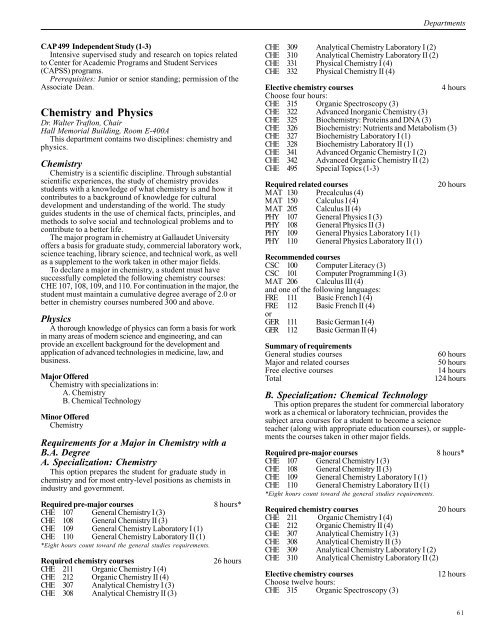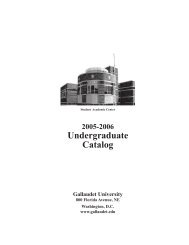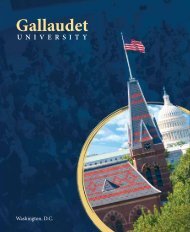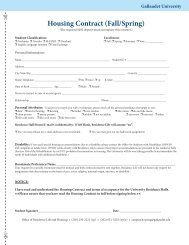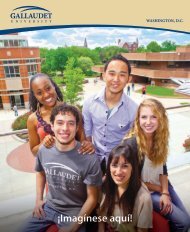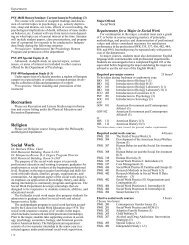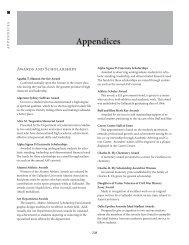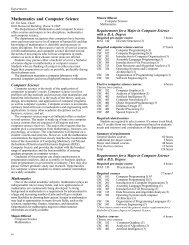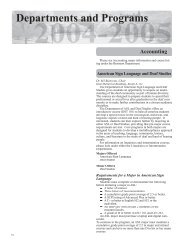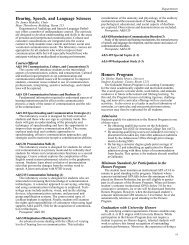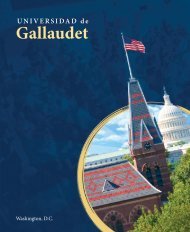Chemistry and Physics - Gallaudet University
Chemistry and Physics - Gallaudet University
Chemistry and Physics - Gallaudet University
You also want an ePaper? Increase the reach of your titles
YUMPU automatically turns print PDFs into web optimized ePapers that Google loves.
DepartmentsCAP 499 Independent Study (1-3)Intensive supervised study <strong>and</strong> research on topics relatedto Center for Academic Programs <strong>and</strong> Student Services(CAPSS) programs.Prerequisites: Junior or senior st<strong>and</strong>ing; permission of theAssociate Dean.<strong>Chemistry</strong> <strong>and</strong> <strong>Physics</strong>Dr. Walter Trafton, ChairHall Memorial Building, Room E-400AThis department contains two disciplines: chemistry <strong>and</strong>physics.<strong>Chemistry</strong><strong>Chemistry</strong> is a scientific discipline. Through substantialscientific experiences, the study of chemistry providesstudents with a knowledge of what chemistry is <strong>and</strong> how itcontributes to a background of knowledge for culturaldevelopment <strong>and</strong> underst<strong>and</strong>ing of the world. The studyguides students in the use of chemical facts, principles, <strong>and</strong>methods to solve social <strong>and</strong> technological problems <strong>and</strong> tocontribute to a better life.The major program in chemistry at <strong>Gallaudet</strong> <strong>University</strong>offers a basis for graduate study, commercial laboratory work,science teaching, library science, <strong>and</strong> technical work, as wellas a supplement to the work taken in other major fields.To declare a major in chemistry, a student must havesuccessfully completed the following chemistry courses:CHE 107, 108, 109, <strong>and</strong> 110. For continuation in the major, thestudent must maintain a cumulative degree average of 2.0 orbetter in chemistry courses numbered 300 <strong>and</strong> above.<strong>Physics</strong>A thorough knowledge of physics can form a basis for workin many areas of modern science <strong>and</strong> engineering, <strong>and</strong> canprovide an excellent background for the development <strong>and</strong>application of advanced technologies in medicine, law, <strong>and</strong>business.Major Offered<strong>Chemistry</strong> with specializations in:A. <strong>Chemistry</strong>B. Chemical TechnologyMinor Offered<strong>Chemistry</strong>Requirements for a Major in <strong>Chemistry</strong> with aB.A. DegreeA. Specialization: <strong>Chemistry</strong>This option prepares the student for graduate study inchemistry <strong>and</strong> for most entry-level positions as chemists inindustry <strong>and</strong> government.Required pre-major courses 8 hours*CHE 107 General <strong>Chemistry</strong> I (3)CHE 108 General <strong>Chemistry</strong> II (3)CHE 109 General <strong>Chemistry</strong> Laboratory I (1)CHE 110 General <strong>Chemistry</strong> Laboratory II (1)*Eight hours count toward the general studies requirements.Required chemistry courses 26 hoursCHE 211 Organic <strong>Chemistry</strong> I (4)CHE 212 Organic <strong>Chemistry</strong> II (4)CHE 307 Analytical <strong>Chemistry</strong> I (3)CHE 308 Analytical <strong>Chemistry</strong> II (3)CHE 309 Analytical <strong>Chemistry</strong> Laboratory I (2)CHE 310 Analytical <strong>Chemistry</strong> Laboratory II (2)CHE 331 Physical <strong>Chemistry</strong> I (4)CHE 332 Physical <strong>Chemistry</strong> II (4)Elective chemistry courses 4 hoursChoose four hours:CHE 315 Organic Spectroscopy (3)CHE 322 Advanced Inorganic <strong>Chemistry</strong> (3)CHE 325 Biochemistry: Proteins <strong>and</strong> DNA (3)CHE 326 Biochemistry: Nutrients <strong>and</strong> Metabolism (3)CHE 327 Biochemistry Laboratory I (1)CHE 328 Biochemistry Laboratory II (1)CHE 341 Advanced Organic <strong>Chemistry</strong> I (2)CHE 342 Advanced Organic <strong>Chemistry</strong> II (2)CHE 495 Special Topics (1-3)Required related courses 20 hoursMAT 130 Precalculus (4)MAT 150 Calculus I (4)MAT 205 Calculus II (4)PHY 107 General <strong>Physics</strong> I (3)PHY 108 General <strong>Physics</strong> II (3)PHY 109 General <strong>Physics</strong> Laboratory I (1)PHY 110 General <strong>Physics</strong> Laboratory II (1)Recommended coursesCSC 100 Computer Literacy (3)CSC 101 Computer Programming I (3)MAT 206 Calculus III (4)<strong>and</strong> one of the following languages:FREFRE111112Basic French I (4)Basic French II (4)orGERGER111112Basic German I (4)Basic German II (4)Summary of requirementsGeneral studies courses 60 hoursMajor <strong>and</strong> related courses 50 hoursFree elective courses 14 hoursTotal 124 hoursB. Specialization: Chemical TechnologyThis option prepares the student for commercial laboratorywork as a chemical or laboratory technician, provides thesubject area courses for a student to become a scienceteacher (along with appropriate education courses), or supplementsthe courses taken in other major fields.Required pre-major courses 8 hours*CHE 107 General <strong>Chemistry</strong> I (3)CHE 108 General <strong>Chemistry</strong> II (3)CHE 109 General <strong>Chemistry</strong> Laboratory I (1)CHE 110 General <strong>Chemistry</strong> Laboratory II (1)*Eight hours count toward the general studies requirements.Required chemistry courses 20 hoursCHE 211 Organic <strong>Chemistry</strong> I (4)CHE 212 Organic <strong>Chemistry</strong> II (4)CHE 307 Analytical <strong>Chemistry</strong> I (3)CHE 308 Analytical <strong>Chemistry</strong> II (3)CHE 309 Analytical <strong>Chemistry</strong> Laboratory I (2)CHE 310 Analytical <strong>Chemistry</strong> Laboratory II (2)Elective chemistry courses 12 hoursChoose twelve hours:CHE 315 Organic Spectroscopy (3)61
DepartmentsCHE 322 Advanced Inorganic <strong>Chemistry</strong> (3)CHE 325 Biochemistry: Proteins <strong>and</strong> DNA (3)CHE 326 Biochemistry: Nutrients <strong>and</strong> Metabolism (3)CHE 327 Biochemistry Laboratory I (1)CHE 328 Biochemistry Laboratory II (1)CHE 341 Advanced Organic <strong>Chemistry</strong> I (2)CHE 342 Advanced Organic <strong>Chemistry</strong> II (2)CHE 495 Special Topics (1-3)Required related course 4 hoursMAT 130 Precalculus (4)Recommended courseCSC 100 Computer Literacy (3)Summary of requirementsGeneral studies coursesMajor <strong>and</strong> related courses60 hours34 hoursFree elective coursesTotal30 hours124 hoursRequirements for a Major in <strong>Chemistry</strong> with aB.S. DegreeThe Bachelor of Science degree in <strong>Chemistry</strong> provides anopportunity for a chemistry major to take a more rigorouscalculus-based course of study in <strong>Chemistry</strong>. This optionprepares the student for graduate study in chemistry <strong>and</strong> formost entry-level positions as chemists in industry <strong>and</strong>government.Required pre-major courses 8 hoursCHE 107 General <strong>Chemistry</strong> I (3)CHE 108 General <strong>Chemistry</strong> II (3)CHE 109 General <strong>Chemistry</strong> Laboratory I (1)CHE 110 General <strong>Chemistry</strong> Laboratory II (1)Required chemistry courses 32 hoursCHE 211 Organic <strong>Chemistry</strong> I (4)CHE 212 Organic <strong>Chemistry</strong> II (4)CHE 307 Analytical <strong>Chemistry</strong> I (3)CHE 308 Analytical <strong>Chemistry</strong> II (3)CHE 309 Analytical <strong>Chemistry</strong> Laboratory I (2)CHE 310 Analytical <strong>Chemistry</strong> Laboratory II (2)CHE 322 Advanced Inorganic <strong>Chemistry</strong> (3)CHE 331 Physical <strong>Chemistry</strong> I (4)CHE 332 Physical <strong>Chemistry</strong> II (4)Choose one course from the following:CHE 325 Biochemistry: Proteins <strong>and</strong> DNA (3)CHE 326 Biochemistry: Nutrients <strong>and</strong> Metabolism (3)Required related courses 16 hours*MAT 150 Calculus I (4)*MAT 205 Calculus II (4)PHY 142 <strong>Physics</strong> I (3)*PHY 144 <strong>Physics</strong> I Laboratory (1)*PHY 241 <strong>Physics</strong> II (3)*PHY 243 <strong>Physics</strong> II Laboratory (1)**Twelve hours count toward the general studies requirement for aBachelor of Science degree in <strong>Chemistry</strong>.Recommended coursesMAT 206 Calculus III (4)CSC 102 Computer Programming II (3)Summary of requirementsGeneral studies courses for a Bachelor of Sciencedegree in <strong>Chemistry</strong> 53-59 hoursPre-major courses8 hoursMajor <strong>and</strong> related courses 36 hoursFree elective courses 21-27 hoursTotal 124 hoursRequirements for a Minor in <strong>Chemistry</strong>Required pre-minor courses 14-15 hours*CHE 107 General <strong>Chemistry</strong> I (3)CHE 108 General <strong>Chemistry</strong> II (3)CHE 109 General <strong>Chemistry</strong> Laboratory I (1)CHE 110 General <strong>Chemistry</strong> Laboratory II (1)MAT 101 Introductory Mathematical Applications (3)MAT 102 Introductory Probability <strong>and</strong> Statistics (3)orMAT 130 Precalculus (4)*Eleven hours count toward the general studies requirements.Required courses 18 hoursCHE 211 Organic <strong>Chemistry</strong> I (4)CHE 212 Organic <strong>Chemistry</strong> II (4)CHE 307 Analytical <strong>Chemistry</strong> I (3)CHE 308 Analytical <strong>Chemistry</strong> II (3)CHE 309 Analytical <strong>Chemistry</strong> Laboratory I (2)CHE 310 Analytical <strong>Chemistry</strong> Laboratory II (2)Total 21-22 hours<strong>Chemistry</strong> Courses OfferedCHE 103 Introduction to <strong>Chemistry</strong> I (3)This course is designed for liberal arts students with littleor no background in chemistry who do not intend to major inany science. Basic topics include the scientific method,composition of matter, atomic structure, nuclear chemistry,bonding, chemical formulas <strong>and</strong> equations, <strong>and</strong> basic organicchemistry. Knowledge of basic math will be used to solve themost basic problems; for example, for simple unit conversions<strong>and</strong> stoichiometry of chemical reactions. A simultaneouslaboratory course, CHE 105, should be registered for separately.Three one-hour lectures a week.Prerequisite or corequisite: ENG 102 or equivalentCorequisite: CHE 105CHE 104 Introduction to <strong>Chemistry</strong> II (3)This course is a continuation of CHE 103 <strong>and</strong> exploresvarious applications <strong>and</strong> implications of chemistry in ourdaily lives, such as polymers, metals <strong>and</strong> minerals, environmentalchemistry, energy resources of the earth, foodchemistry <strong>and</strong> nutrition, drugs, <strong>and</strong> poisons. A simultaneouslaboratory course, CHE 106, is requred <strong>and</strong> should beregistered for separately. Three one-hour lectures a week.Corequisite: CHE 106CHE 105 Introduction to <strong>Chemistry</strong> Laboratory I (1)This laboratory covers topics such as metric <strong>and</strong> temperaturemeasurements, physical <strong>and</strong> chemical changes, basicreactions, pH <strong>and</strong> basic organic chemistry. The studentdevelops basic skills in writing laboratory reports. One twohourlaboratory a week.Corequisites: CHE 103Course fee: $35CHE 106 Introduction to <strong>Chemistry</strong> Laboratory II (1)This laboratory course is a continuation of CHE 105 <strong>and</strong>covers such topics as water pollution, soap making, synthesisof nylon, properties of hard water, <strong>and</strong> analysis of food<strong>and</strong> a simple organic synthesis. The student continues todevelop laboratory report writing skills. One two-hourlaboratory a week.Prerequisite: CHE 105Corequisite: CHE 104Course fee: $3562
DepartmentsCHE 107 General <strong>Chemistry</strong> I (3)Designed for science majors, this is the first of a twosemestersequence <strong>and</strong> is designed to help students becomefamiliar with the properties <strong>and</strong> reactions of matter. Thiscourse will also address modern applications of theseconcepts. Specific topics for this course include: observationof properties <strong>and</strong> changes, scientific method, unitconversions <strong>and</strong> measurements, chemical formulas, balancingequations, predicting products <strong>and</strong> yields, reactions <strong>and</strong>reaction types, the Ideal Gas Law, thermodynamics, molecular<strong>and</strong> atomic structure of matter, <strong>and</strong> orbital hybridization.Prerequisite: MAT 013Prerequisite/corequisite: ENG 102 or equivalentCorequisite: CHE 109CHE 108 General <strong>Chemistry</strong> II (3)Designed for science majors, this course is the second of atwo-semester sequence <strong>and</strong> is designed to help studentsbecome familiar with the properties <strong>and</strong> reactions of matter.This course will also address modern applications of theseconcepts. Specific topics for this course include: chemicalbonding concepts, solution chemistry, colligative properties,kinetics, equilibrium, acids <strong>and</strong> bases, solubility <strong>and</strong> equilibria,entropy, free energy, electrochemistry, <strong>and</strong> nuclearchemistry.Prerequisite: CHE 107Corequisite: CHE 110CHE 109 General <strong>Chemistry</strong> Laboratory I (1)A laboratory course to accompany CHE 107, this courseenables students to develop skills appropriate to the firstyearchemistry course for science majors. Experiments forthis course include: observation of properties <strong>and</strong> changes,measurements, observing activities <strong>and</strong> reactions for thevarious types of reactions, obtaining quantitative <strong>and</strong>qualitative information regarding products, <strong>and</strong> the use ofcomputer simulations.Corequisite: CHE 107Course fee: $35CHE 110 General <strong>Chemistry</strong> Laboratory II (1)A laboratory course to accompany CHE 108, this courseenables students to develop skills appropriate to the firstyearchemistry course for science majors. Experiments for thiscourse include: quantifying thermodynamic changes,observing colligative properties, evaluation of chemicalkinetics, evaluation of acid/base reactions via titration, <strong>and</strong>the use of computer simulations.Corequisite: CHE 108Course fee: $35CHE 211 Organic <strong>Chemistry</strong> I (4)This is the first course of a two-semester sequence. Astudy of the structure, nomenclature, reactions <strong>and</strong> spectroscopyof organic compounds. Functional groups such asalkanes, alkyl halides, alcohols, <strong>and</strong> ethers are discussed.The laboratory covers the techniques for preparing <strong>and</strong>purifying organic compounds. Three lectures <strong>and</strong> one threehourlaboratory.Prerequisites: CHE 107, 108, 109, 110; or permission of theinstructorCourse fee: $35CHE 212 Organic <strong>Chemistry</strong> II (4)The second course in a two-semester sequence. Afunctional group approach to organic chemistry with anemphasis on alkenes, alkynes, aromatic compounds, aldehydes,ketones, carboxylic acids, <strong>and</strong> amines. The laboratorycovers the techniques for preparing <strong>and</strong> purifying organiccompounds. Three lectures <strong>and</strong> one three-hour laboratory.Prerequisites: CHE 211; or permission of the instructorCourse fee: $35CHE 250 Introduction to Forensic Science (3)This course investigates the chemical aspects <strong>and</strong>applications of forensics studies. The lecture <strong>and</strong> thelaboratory provide a means to develop skills in the followingareas: soil analysis <strong>and</strong> organic analysis, fingerprint analysis<strong>and</strong> foot print analysis, hair analysis, fiber analysis, physicalevidence evaluation, document examination, forensicanthropology, forensic toxicology <strong>and</strong> drug analysis.Prerequisites: One year of either Biology with lab or<strong>Chemistry</strong> with lab.Course fee: $35CHE 307 Analytical <strong>Chemistry</strong> I (3)This is the first course of a two-semester course sequenceon basic quantitative methods of chemical analysis. Thecourse focuses on basic analytical tools, such as measurements,analysis of experimental errors, gravimetric methods<strong>and</strong> volumetric analysis.Prerequisites: CHE 107, 108, 109, 110; MAT 101, 102 or130Corequisite: CHE 309CHE 308 Analytical <strong>Chemistry</strong> II (3)This is the second <strong>and</strong> last course of a one-year coursesequence on basic quantitative methods of chemical analysis.The second semester covers instrumental topics, suchas potentiometry, spectroscopy, analytical separations,chromatographic methods <strong>and</strong> quality assurance.Prerequisites: CHE 307, 309; MAT 101, 102 or 130Corequisite: CHE 310CHE 309 Analytical <strong>Chemistry</strong> Laboratory I (2)This is the first laboratory course of a two-laboratorycourse sequence, focusing on applications of the basicquantitative methods of chemical analysis in the laboratory.The course focuses on basic analytical tools, such asmeasurements, analysis of experimental errors, qualityassurance, gravimetric methods <strong>and</strong> volumetric analysis.Two three-hour laboratory sessions per week.Prerequisites: CHE 107, 108, 109, 110; MAT 101, 102 or130Corequisite: CHE 307Course fee: $35CHE 310 Analytical <strong>Chemistry</strong> Laboratory II (2)This is the second <strong>and</strong> last laboratory course of a twolaboratorycourse sequence, focusing on applications of thebasic quantitative methods of chemical analysis in thelaboratory. This course focuses on instrumental methods,such as pH, spectroscopy, analytical separations <strong>and</strong>chromotographic methods. Two three-hour laboratorysessions per week.Prerequisites: CHE 307, 309; MAT 101, 102 or 130Corequisite: CHE 308Course fee: $35CHE 315 Organic Spectroscopy (3)The identification of organic compounds using varioustypes of spectroscopy. Two lectures <strong>and</strong> one three-hourlaboratory each week.Prerequisites: CHE 211, 21263
DepartmentsCHE 322 Advanced Inorganic <strong>Chemistry</strong> (3)Application of modern chemical theories of structures,bonds, <strong>and</strong> reactions to inorganic substances.Prerequisites: CHE 211, 212, 301, 302CHE 325 Biochemistry: Proteins <strong>and</strong> DNA (3)A study of the principles <strong>and</strong> reactions that involve proteins<strong>and</strong> DNA in biological systems. The course investigates thestructure <strong>and</strong> chemistry of amino acids, the combination of theamino acids in the formation of proteins, the function <strong>and</strong>structure of proteins, the building blocks of DNA, the chemistry<strong>and</strong> structure of DNA, the structure of RNA, the replication ofDNA, <strong>and</strong> current topics in biochemical/biomedical engineering.Prerequisites: CHE 211, 212; BIO 101 <strong>and</strong> 102 or 332CHE 326 Biochemistry: Nutrients <strong>and</strong> Metabolism (3)A study of the principles <strong>and</strong> reactions that occur uponthe intake of nutrients (including carbohydrates, lipids, <strong>and</strong>proteins) in biological systems. The course will evaluate theprocesses by which nutrients are metabolized. The breakdownof substances taken in from the environment will be studied.This will be followed by an analysis of the reactions that createthe molecules necessary <strong>and</strong> usable by living organisms.Prerequisites: CHE 211, 212; BIO 101 <strong>and</strong> 102 or 332CHE 327 Biochemistry Laboratory I (1)A laboratory course to accompany CHE 325. Qualitative<strong>and</strong> quantitative experiments related to ordinary biologicalchemicalmaterials. One three-hour laboratory.Corequisite: CHE 325Course fee: $35CHE 328 Biochemistry Laboratory II (1)A laboratory course to accompany CHE 326. Qualitative<strong>and</strong> quantitative experiments related to ordinary biologicalchemicalmaterials. One three-hour laboratory.Prerequisite: CHE 327Corequisite: CHE 326Course fee: $35CHE 331 Physical <strong>Chemistry</strong> I (4)The first course of a two-semester sequence. An introductionto the basic laws of thermodynamics <strong>and</strong> the applicationof these laws to chemical equilibria, phase equilibria, electrochemistry,<strong>and</strong> biochemistry. The laboratory part of thecourse covers the observation, measurement <strong>and</strong> calculationof various physical properties. Three lectures <strong>and</strong> one threehourlaboratory.Prerequisites: PHY 107, 108, 109, 110 or PHY 142, 144, 241,243; MAT 205Course fee: $35CHE 332 Physical <strong>Chemistry</strong> II (4)The second course of a two-semester sequence. Anintroduction to quantum mechanics, chemical kinetics, <strong>and</strong>statistical mechanics. The laboratory part of this coursecovers the observation, measurement an calculation ofvarious physical chemical properties. Three lectures <strong>and</strong> onethree-hour laboratory.Prerequisites: CHE 331Course fee: $35CHE 341 Advanced Organic <strong>Chemistry</strong> I (2)The first course of a two-semester sequence. A study ofthe structure of organic molecules on a more advanced levelusing molecular orbital theory. The mechanisms of somereactions are studied using molecular orbital theory. Twolectures.Prerequisites: CHE 211, 212CHE 342 Advanced Organic <strong>Chemistry</strong> II (2)The second course of a two-semester sequence. Adetailed study of the reaction mechanisms of several organicchemistry reactions. Two lectures.Prerequisites: CHE 341CHE 495 Special Topics (1-3)Topics not taught in other courses.Course fee: Varies by sectionCHE 499 Independent Study (1-3)Reading, research, discussion, or laboratory according tothe needs of the student.<strong>Physics</strong> Courses OfferedPHY 105 Basic Circuit Analysis (3)An introduction to electronics fundamentals. The coursetopics include current flow, voltage, resistance, Ohm’s Law,magnetism, electrical measurements, series <strong>and</strong> parallelcircuits, Kirchhoff’s Laws, Thevenin’s theorem, Norton’stheorem, bridge circuits, inductance, capacitance, alternatingcurrent, AC meters, oscilloscopes, capacitors in AC circuits,RC circuits, inductors in AC circuits, RL circuits, transformers,transformer applications, tuned circuits, <strong>and</strong> LC filters.Supplemental mathematics <strong>and</strong> data analysis topics will beintroduced.Corequisite: PHY 105LPHY 105L Basic Electronics Laboratory (1)A laboratory course that illustrates topics discussed in<strong>Physics</strong> 105 including current flow, voltage, resistance,Ohm’s Law, magnetism, electrical measurements, series <strong>and</strong>parallel circuits, Kirchhoff’s Laws, Thevenin’s theorem,Norton’s theorem, bridge circuits, inductance, <strong>and</strong> capacitance.Three hours of laboratory.Corequisite: PHY 105PHY 107 General <strong>Physics</strong> I (3)The first course of a two-semester sequence. An introductionto traditional topics in classical <strong>and</strong> modern physics:classical mechanics, fluids, waves <strong>and</strong> sound. Emphasis ison development <strong>and</strong> application of analytic (non-calculus)<strong>and</strong> computer-based modeling <strong>and</strong> problem solving methods.Prerequisites or corequisites: MAT 130 or MAT 102; ENG102 or the equivalentCorequisite: PHY 109PHY 108 General <strong>Physics</strong> II (3)The second course of a two-semester sequence. Anintroduction to traditional topics in classical <strong>and</strong> modernphysics: temperature, gas dynamics, <strong>and</strong> thermodynamicselectricity, magnetism, light, optics, quantum theory, atomic<strong>and</strong> molecular structure, radioactivity, <strong>and</strong> nuclear structure.Emphasis is on development <strong>and</strong> application of analytic(non-calculus) <strong>and</strong> computer-based modeling <strong>and</strong> problemsolving methods.Prerequisite: PHY 107Corequisite: PHY 110PHY 109 General <strong>Physics</strong> Laboratory I (1)A laboratory course to accompany PHY 107. It provides aproject-centered experience in doing science: planning,collecting data, visualizing data <strong>and</strong> science processes,reviewing current research <strong>and</strong> technologies, critiquingalternatives <strong>and</strong> publishing results.Prerequisite: MAT 130 or MAT 102, either of which maybe taken concurrently.Corequisites: PHY 107Course fee: $3564
DepartmentsPHY 110 General <strong>Physics</strong> Laboratory II (1)A laboratory course to accompany PHY 108. It provides aproject-centered experience in doing science: planning,collecting data, visualizing data <strong>and</strong> science processes,reviewing current research <strong>and</strong> technologies, critiquingalternatives <strong>and</strong> publishing results.Prerequisite: PHY 109Corequisite: PHY 108Course fee: $35PHY 121 Earth Systems <strong>and</strong> Processes (3)This course studies the earth system, hazardous geologicprocesses, <strong>and</strong> earth resources. Models that quantify thecycling of elements within the Earth system provide aunifying theme in the course. Study of cycles of the elementsmakes explicit the Earth’s “metabolic” processes <strong>and</strong> uncoversthe facts of human dependence on maintenance ofnatural recycling processes.Prerequisite or corequisite: ENG 102 or the equivalentCorequisite: PHY 123PHY 122 Space <strong>and</strong> Astronomical Science (3)This course studies our solar system <strong>and</strong> the universewith special emphasis on planetary science <strong>and</strong> the possibilitiesfor space travel. Nearby planets <strong>and</strong> moons will be contrastedwith Earth to highlight the uniqueness of our planet.Prerequisite or corequisite: ENG 102 or the equivalentCorequisite: PHY 124PHY 123 Earth Systems <strong>and</strong> Processes Laboratory (1)Case studies of explorations, catastrophes, technologyapplication <strong>and</strong> human disturbance will provide focus forproject work confronting a question or challenge thatrequires experimental design, implementation, data collection<strong>and</strong> publication of results.Corequisite: PHY 121Course fee: $35PHY 124 Space <strong>and</strong> Astronomical Science Laboratory (1)Case studies <strong>and</strong> science fiction accounts of explorations,resource extraction, technology application will providefocus for project work confronting a question or challengethat requires experimental design, implementation, datacollection <strong>and</strong> publication of results.Corequisite: PHY 122Course fee: $35PHY 141 Introduction to Engineering Design (3)This course introduces the student to product design <strong>and</strong>development, including product investigation, design,manufacture, assembly <strong>and</strong> performance evaluation by meansof a semester-long project. Fundamentals of design <strong>and</strong>project-related technicalities will be taught in class lectures<strong>and</strong> actual project implementation will be accomplished inteams.Prerequisite/corequisite: MAT 150PHY 142 <strong>Physics</strong> I (3)This introductory course uses methods of calculus toinvestigate topics in the mechanics <strong>and</strong> dynamics of rigidbodies: kinesics of one <strong>and</strong> two dimensional motion, vectors,Newton’s law of motion, energy, linear momentum, rigid bodyrotation kinematics, torque, angular momentum <strong>and</strong> the law ofgravity.Prerequisite/corequisite: MAT 205PHY 144 <strong>Physics</strong> I Laboratory (1)This is the companion laboratory to PHY 142 <strong>Physics</strong> I.Through a sequence of selected experiments, students willpractice experiment design, report writing, use of st<strong>and</strong>ardinstrumentation, data visualization, <strong>and</strong> error analysis skills.Prerequisite/corequisite: PHY 142Course fee: $35PHY 205 Introduction to Computer Electronics (3)Introduction to the use of integrated circuit electronicswith computer application. Basic electricity, circuit breadboarding,gates, truth tables, multidecade counters, decoders,demultiplexers, multiplexers, sequences, LED displays,busing, flip-flops, memories, registers, counters, <strong>and</strong> thearithmetic logic unit.Prerequisite: Permission of instructorCorequisite: PHY 205LPHY 205L Digital Circuits (1)A laboratory course that illustrates topics covered in PHY 205.Corequisite: PHY 205PHY 207 Introduction to Microprocessors (3)An introduction to microprocessor programming <strong>and</strong>electronics. The course topics include number systems <strong>and</strong>codes, microcomputer basics, addressing modes, binaryarithmetic, branching, programming algorithms, microprocessorarchitecture, microprocessor instruction set, stack operations,subroutines, I/O operations, interrupts, interface fundamentals,the peripheral interface adapter, <strong>and</strong> using the PIA.Prerequisite: Permission of the instructorCorequisite: PHY 207LPHY 207L Basic Microprocessors Lab (1)A laboratory course that illustrates topics covered in PHY207. Three hours of laboratory.Corequisite: PHY 207PHY 241 <strong>Physics</strong> II (3)This introductory course uses methods of calculus toinvestigate topics in fluids, vibrations/wave motion, heat,kinetic theory, thermodynamics, electrostatics <strong>and</strong> circuits.Prerequisite: PHY 142PHY 242 <strong>Physics</strong> III (3)This introductory course uses methods of calculus toinvestigate topics in electrodynamics, light, relativity, atomic<strong>and</strong> nuclear physics.Prerequisite: PHY 241PHY 243 <strong>Physics</strong> II Laboratory (1)This is the companion laboratory course to PHY 241.Through a sequence of selected experiments, students willpractice experiment design, report writing, use of st<strong>and</strong>ardinstruments, data visualization, <strong>and</strong> error analysis skills.Prerequisite/corequisite: PHY 241Course fee: $35PHY 244 <strong>Physics</strong> III Laboratory (1)This is the companion laboratory course to PHY 242.Through a sequence of selected experiments, students willpractice experiment design, report writing, use of st<strong>and</strong>ardinstruments, data visualization, <strong>and</strong> error analysis skills.Prerequisite/corequisite: PHY 242Course fee: $35PHY 495 Special Topics (1-3)Topics not taught in other courses.Prerequisite: Permission of the instructorPHY 499 Independent Study (1-3)Reading <strong>and</strong> discussion, or laboratory work, according to65
Departmentsthe needs of the student.Prerequisite: Permission of the instructorCommunication StudiesDr. Robert Harrison, ChairKendall Hall, Room 102Courses in the department are designed to provide animportant liberal arts perspective on the process <strong>and</strong> use ofcommunication. Communication is vital to career <strong>and</strong> topersonal <strong>and</strong> social relationships. Through studies inintrapersonal, interpersonal, <strong>and</strong> public communication,students can increase self-underst<strong>and</strong>ing <strong>and</strong> acquire moreeffective tools with which to participate in society. Thesecourses are appropriate for all students but are particularlyimportant for those who plan careers in professions thatrequire more than minimal interpersonal <strong>and</strong>/or groupcontact.Major OfferedCommunication StudiesMinors OfferedCommunication StudiesJournalismRequirements for a Major in CommunicationStudiesRequired pre-major courses9 hoursCOM 280 Group Discussion (3)*(Note: Completion of COM 495H: Public Communication (Honors)as a substitute for the general studies requirement in CommunicationProcesses requires the selection of an additional course in the majorin order to fulfill major requirements.Choose one course:A&S 101 Communication, Culture, <strong>and</strong> Consumerism (3) **DST 101 Introduction to Deaf Studies (3) **Choose one course:PSY 201 Introduction to Psychology (3) ***SOC 101 Introduction to Sociology (3) ****Meets general studies requirement in Communication Processes**Counts toward general studies requirement in Heritage <strong>and</strong> Self-Awareness***Counts toward general studies requirement in Historical <strong>and</strong>Social AnalysisRequired courses 15 hours*COM 290 Public Speaking (3)COM 324 Interpersonal Communication (3)COM 340Business <strong>and</strong> ProfessionalCommmunication (3)COM 370 Introduction to Mass Communication (3)COM 380 Theories of Human Communication (3)*Majors should complete COM 280 Group Discussion <strong>and</strong> COM 290Public Speaking before taking 300 <strong>and</strong> 400 level courses in thisprogram. (three hours of either COM 280 or COM 290 count towardthe general studies requirements.)Elective courses15 hoursChoose 15 hours:COM 270 Parliamentary Procedure (3)COM 330 Intimate Communication (3)COM 360 Introduction to Public Relations (3)COM 400 Persuasion (3)COM 410 Advanced Public Speaking (3)COM 420 Nonverbal Communication (3)COM 430 Gender <strong>and</strong> Communication (3)COM 440 Intercultural Communication (3)COM 450 Political Communication (3)COM 460 Organizational Communication (3)COM 470 Family Communication (3)COM 475 Communication Law in America (3)COM 480 Argumentation <strong>and</strong> Debate (3)COM 485Captioning: Technology, Policy, <strong>and</strong>Practice (3)COM 493 Senior Seminar (2-3)COM 495COM 499Special Topics (3)Independent Study (1-3)Required related courses 4-6 hoursTake one field experience course:CAP 320 Field Experience (1-3)**Field experience (internship) should be completed off-campusduring spring or summer of junior year.Take one of the following English courses:ENG 380 Writing for the Business <strong>and</strong> ProfessionalWorld (3)ENG 381 Editing (3)ENG 385 Fundamentals of Journalism (3)ENG 396 Technical <strong>and</strong> Managerial Writing (3)Summary of requirementsGeneral studies coursesMajor <strong>and</strong> related courses60 hours34-36 hoursFree elective coursesTotal28-30 hours124 hours(Note: Students may not repeat the same course offered by thedepartment more than twice.)Requirements for a Minor in CommunicationStudiesRequired courses 15 hoursCOM 280 Group Discussion (3)*COM 290 Public Speaking (3)*COM 324 Interpersonal Communication (3)COM 340 Business <strong>and</strong> Professional Communication (3)COM 370 Introduction to Mass Communication (3)COM 380 Theories of Human Communication (3)*Three hours of either COM 280 or COM 290 count toward thegeneral studies requirements.Elective Courses3 hoursChoose three hours of electives in consultation with the department.Total 18 hoursRequirements for a Minor in JournalismStudents planning to minor in journalism must completeeither ENG 204 or the equivalent <strong>and</strong> provide evidence ofwriting effectiveness (a writing sample) to the English <strong>and</strong>Communications Studies department chairs. Courses taken tosatisfy major requirements in either Communication Studiesor English cannot be counted toward this minor.Required courses 12 hoursENG 381 Editing (3)ENG 385 Fundamentals of Journalism (3)COM 360 Introduction to Public Relations (3)COM 370 Introduction to Mass Communication (3)Elective courses 6 hoursChoose six hours:ENGENG395396Advanced Composition (3)Technical <strong>and</strong> Managerial Writing (3)ENG 495 Special Topics (writing-related issues) (3)66


